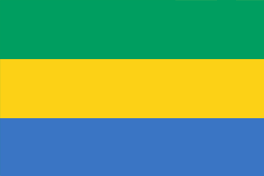 |
République gabonaiseIndependence 17 August 1960
History Gabon's location has been both a blessing and a curse. Its dense forest – a copious jungle – is home to substantial renewable forest resources and game. Gabon Estuary, so named by the Portuguese because its shape suggests a sailor's jacket (gabão), is long thought to be a river and attracts Europeans to settle on its banks, where in 1849 the French establish Libreville, modelled on the British Freetown, to welcome slaves wrested from slave ships after Europe abolishes the trade in 1815. Environmental factors, especially climate and vegetation, cause 'underpopulation', aggravated by endemic and epidemic diseases, which persists to this day. The major demographic event is the 19th century arrival of Fang peoples, and increases the country's diversity. Unlike its neighbours, Gabon never experiences large centralized states. The main chiefdoms and most well known city-states are along the coast, on the estuary's banks, at the mouth of the Ogooue River and at Fernan Vaz. Established in the first half of the 19th century, the French presence takes colonial form after the expeditions of Pierre Savorgnan de Brazza in the 1870s and 1880s. Nationalist sentiment grows in French Equatorial Africa, created in 1910 as a federation of territories, fuelled by the discontent of French colonists and Gabonese over the flow of revenue to Brazzaville. Massive expropriations led by concessionary companies and foresters incite an anti-colonial, though not necessarily anti-French, movement embodied by Léon Mba, a follower of local religions and a Catholic, once associated with Freemasons and French communists, and the first president of the republic (1960-1967). In the 1960s, okoumé wood is gradually replaced by oil and minerals as the chief export, leading to exceptional economic growth from which Léon Mba's successor, Omar Bongo Ondimba (1967-2009), greatly benefits. Elikia M'Bokolo (EHESS/UNIKIN) |


